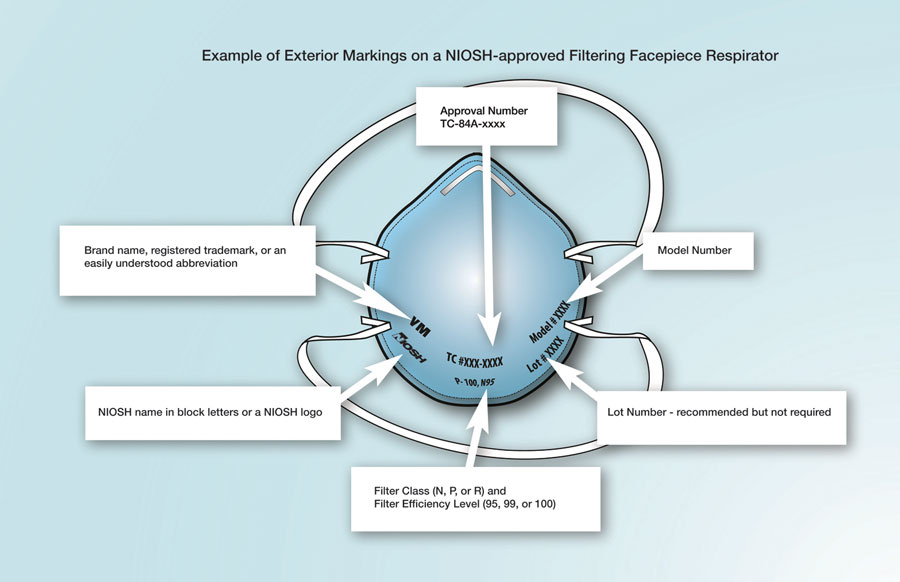COVID-19 has changed our public behavior for almost two years. Now Omicron is doing it again, as people are urged to replace their cloth masks with the best-available protection, an N95 filtering faceplate respirator.
Just what scam artists wanted to hear. The sudden demand for N95 masks has created an equally sudden opportunity for sellers of counterfeits.
“We’re seeing fakes,” says Dr. Ulysses Wu, Hartford HealthCare’s System Director of Infection Disease and Chief Epidemiologist, “whether it be tests, whether it be maks, whether it be treatment — whatever it may be.”
An N95, with its tight seal around the face, is the go-to mask now because filters at least 95 percent of tiny, as in 0.3 microns, particles. A properly fitted N95 filters bacteria, dust and, most notably during Omicron, viral particles. (To find out the differences between an N95, a KN95 and a KF94, click here.) The Centers for Disease Control and Prevention updated its guidance Jan. 14, adding N95 and KN95 masks as options because they offer the best protection against the virus.
“So why do we wear surgical masks?” says Dr. Wu. “Because we believe that the majority of COVID is these big droplets that don’t hang in the air. The problem now is how much do we know is aerosolized, so they go into smaller droplet that tend to hang in the air much longer? Which is why you now use N95s.”
An N95 mask, unlike a KN95 or KF94, must conform to National Institute for Occupational Safety and Health standards. A legitimate N95 is sold as NIOSH-certified or NIOSH-approved, with an appropriate label on or inside the packaging. An abbreviated approval marking is also on the mask. (To search for specific certified N95 masks, click here.)
“You always want to buy from a reputable company,” says Dr. Wu, “a major pharmacy or if you try to buy these on Amazon you want to get it through their verified marketplace as opposed to somebody that may be random on the internet.”
Signs That a Respirator Might Be Counterfeit
The CDC suggests watching for these giveaways:
- No markings on the filtering facepiece respirator.
- No approval (TC) number on the respirator or headband.
- No NIOSH markings.
- NIOSH spelled incorrectly.
- Presence of decorative fabric or other decorative add-ons (such as sequins).
- Claims of approval for children. (NIOSH does not approve any type of respiratory protection for children.)
- Filtering facepiece respirator has ear loops instead of headbands.

Buying an N95 Make on Third-Party Marketplaces
The CDC offers these tips:
- If a listing claims to be “legitimate” and “genuine,” it likely is not.
- Look at the transaction history and reviews, if possible. Most auction sites or third-party distributors have a link to the seller of the item and their past sales.
- Many buyers will leave reviews about their experience or quality of the product.
- Are there changes to the items sold over time? (High or low periods of transaction?) Is the seller marketing the same products over time, or are they mainly selling trending items? Legitimate businesses and suppliers typically sell the same items over time.
- A buyer can view this by looking at the businesses’ other products. Buyers should also be able to learn more about sellers on big online platforms (reviews of the seller).
- Are there price changes or swings? (Is it too good to be true?)
- Look at the quantity a buyer has in stock. During a time of shortage, advertising “unlimited stock” could indicate the respirator is not NIOSH-approved.
- Does the seller break marketplace policy and hide contact information within images? Typical third-party marketplaces require the seller and buyer to interact within an on-site messaging system. Sellers should not try to bypass this system to display personal contact information.
If you can’t find an N95, don’t panic. Just don’t use your old cloth mask.
“Surgical masks are most readily accessible and, if worn properly, should protect you,” says Dr. Wu.